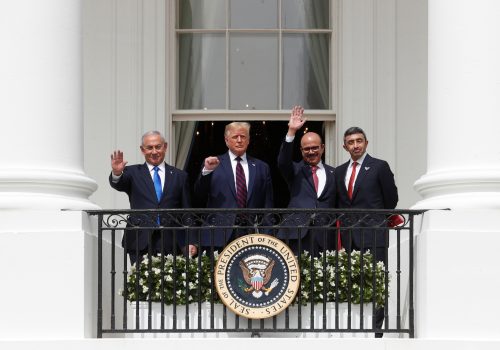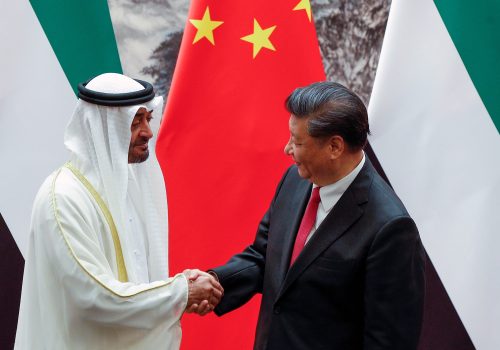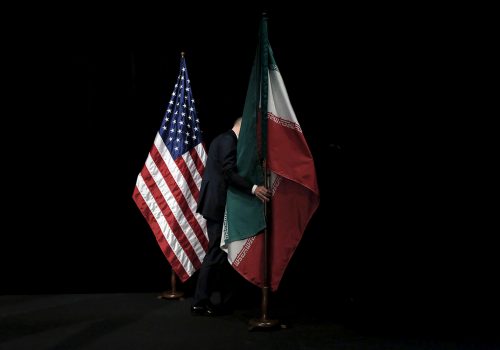Adding an Ishmael Track to the Abraham Accords: How to pursue détente between Iran, Saudi Arabia, and the UAE
The Abraham Accords between Israel and Gulf nations have taught us the important lesson that long-standing animosities can be set aside when greater national interests are served by making peace. Which raises the question: Do national interests make a compelling case for a thaw in the Gulf?
Ongoing discussions among Gulf watchers about the need to de-escalate the protracted gray-zone conflict between Iran and her neighbors Saudi Arabia and the United Arab Emirates (UAE) are really discussions about pathways to normalization. Viewed through the lens of national interests, it appears that détente, with the prospect of normalization, would carry substantial benefits for all parties.
Both Saudi Arabia and Iran have flirted with warming relations in recent years. In 2017, the Kingdom hosted Moqtada Al Sadr, the powerful Iraqi Shi’a cleric who has close ties to Iran, in Riyadh and discussed ways to reduce tensions with Iran. Following the attack on Saudi Aramco’s Abqaiq oil facility in 2019, which Western intelligence services tied to Iran, Tehran reached out to Riyadh and Abu Dhabi with an offer to discuss de-escalation. The UAE quietly engaged in exploratory talks, but Riyadh was not interested at the time. Based on recent reports of Saudi-Iran talks in Baghdad, it appears that both sides may now see value in a gentleman’s agreement. Saudi Crown Prince Mohamed bin Salman says the Kingdom is seeking “a good and positive relationship with Iran.” There is no time like the present.
Why détente makes dollars and sense
Economically, Iran can use all the help it can get. Détente could lead to new and enhanced trade relations with the Gulf, thereby boosting Iranian sectors outside of oil and gas regardless of whether its nuclear negotiations with the United States result in sanctions relief. Currently, about 20 percent of Iran’s exports are from industries other than energy. This share can be expanded by exploiting the Gulf’s market for agricultural products, luxury goods, and the industrial products Iran produces such as chemicals and plastics.
The Gulf nations can benefit in a similar way, tapping into a new market of more than eighty million people in Iran. Increased tourism would further enhance the economic gains.
From a security perspective, Saudi Arabia, the UAE, and Iran all count both Russia and China among their friends. This exposes inherent vulnerabilities for all three, as Russia and China have no interest in taking sides.
Russia and China protect Iran in the United Nations for purely selfish reasons, and Russia would eject Iran from Syria if possible. Leaders in Iraq and Lebanon have divided loyalties between the United States and Iran. When you can’t trust any of your friends, what is the strategic benefit of your international relationships? Iran needs to start making friends or at least reducing its enemies.
On the other side of the Gulf, growing Saudi and Emirati relations with Russia and China will not translate into increased security against the threat they perceive from Iran. Russia and China are transparent about the fact that they will sell arms to both sides of a conflict and will not place their loyalty in any one camp. Any capabilities or training that the Gulf shares with China or Russia are at risk of being shared with Iran, and weapons platforms that the Gulf buys from China or Russia are at risk of being defeated by systems sold to Iran. For all parties, normalization is far cheaper and more secure than an unwinnable arms race.
Saudi Arabia and the UAE are acutely aware that the United States is on a trajectory to reduce its troop presence in the Gulf. The recent decommissioning of the 9th Expeditionary Task Force-Levant that has been headquartered in Kuwait for the past six years in support of Operation Inherent Resolve, the campaign against the Islamic State of Iraq and al-Sham (ISIS), is an example of gradual drawdown, keenly observed by Gulf leaders. Debate within the policy community questions whether a US drawdown is wise due to the continuing attacks against Saudi Arabia from the Houthi rebels in Yemen, without signs from the Houthi camp that they will accept a political settlement in the country in the near term. But US policy has been heading in this direction for some time and a drawdown has bipartisan political support. Therefore, Gulf countries understand that they need to start figuring out how to contribute to their own security. Détente with Iran is one of the only inexpensive ways to do this. It is also one of the only options that is completely under the control of national decision-makers and does not rely on the ability of local security services to build capacity quickly and miraculously.
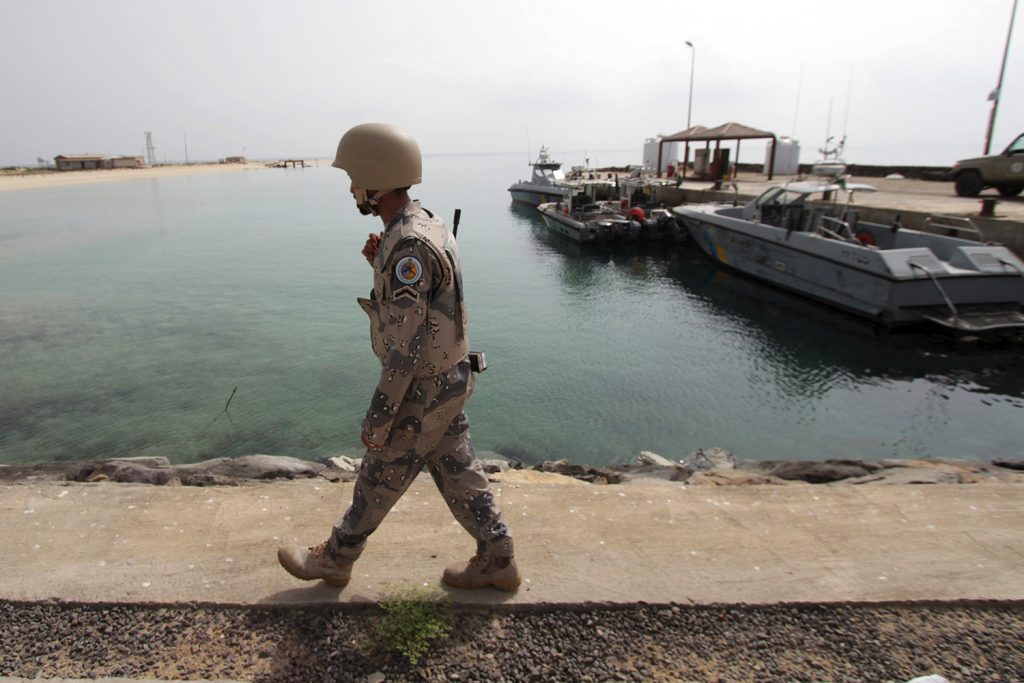
“Gulf countries understand that they need to start figuring out how to contribute to their own security. Détente with Iran is one of the only inexpensive ways to do this.”
Politically, normalization could improve Iran’s standing within the international community, possibly leading to an unfreezing of its foreign assets and less opposition to sanctions rollbacks. Being a global pariah has its costs. Sanctions against Tehran have led to lost revenue and other opportunity costs, like preventing Iran from engaging with other countries on matters such as information-sharing and capacity-building.
The question is: Would the regimes agree to détente and later let normalization happen?
In Tehran, the regime’s governance model relies heavily on state security. The country’s leaders maintain domestic tolerance for this model by saying that they are surrounded by threats in two forms: Sunni Arab neighbors and US military bases. If either of these threats becomes less menacing, it chips away at the regime’s raison d’être.
In Saudi Arabia and the UAE, there is a worry that any reduction in the perceived threat from Iran could justify a further US military drawdown from the region.
Scott Modell, managing director of the Rapidan Energy Group, tells me that détente between Iran and her Arab neighbors would send a signal to the market that Iran-backed attacks on Saudi oil infrastructure—from small-scale Houthi rocket and drone strikes to major offensives such as the Abqaiq attack—will be less likely. The combination of better Iran-Saudi relations and a possible reset of the Iran nuclear agreement, known as the Joint Comprehensive Plan of Action (JCPOA), point to improved regional stability and a full return of Iranian oil production. While it’s too early to factor in the impact on the oil market of any potential Iran-Saudi rapprochement, the market has already started to price in the positive initial readouts on talks to jumpstart the nuclear deal. A full return of Iranian barrels, however, is not yet reflected in the price. While much will depend on the prevailing sentiment about the state of the global economy and how a post-COVID recovery may affect oil demand, the prospect of Iran’s return to full production capacity in 2021 would probably cause a drop of up to five dollars per barrel.
Iran currently exports just over one million barrels per day, most of it to China and in violation of US sanctions. In a best-case scenario, with a new JCPOA in place, Iran could return to full capacity of around 3.8 million barrels per day by the end of this year. Iran will remain at that level until it manages to attract foreign investment to bring on new production and offset declines at older fields.
At first glance, it could be assumed that the mere announcement of a near-term return of more than a million barrels a day of disrupted Iranian oil would cause a $7 to $10 drop in the price of oil, reducing the revenue that Saudi Arabia and the UAE rely on to implement their respective Vision 2020 and Vision 2030 plans. But energy experts expect a more moderate price impact from the full return of Iranian barrels.
Riyadh and Tehran treat the Organization of the Petroleum Exporting Countries (OPEC) as neutral ground despite their intense geopolitical rivalry. With global demand for oil slowly recovering in 2021 and the Biden administration pushing for a renewed JCPOA, Saudi Arabia’s oil planners recognize the potential for a full return of Iranian oil to the market and would not expect Iran to abide by any production quotas.
How to get to détente
Assuming good-faith intentions from all involved, here are five potential options for détente that would demonstrate an intent to tangibly de-escalate and reduce mistrust among the parties. Each has its pros and cons.
1. Iran, Saudi Arabia, and the UAE could sign a pact of mutual non-aggression. This pact could initially be limited to air and naval space and later be followed by pledges to reduce or end support to Iranian groups attacking Saudi Arabia and Gulf-endorsed Iranian opposition groups. The drafters of the language would need to avoid a myopic focus on Yemen. If such a pledge specified only Iranian support for the Houthis, the likely result would be additional Iran-directed attacks on the Kingdom originating from Iraq or even Syria (Saudi Arabia’s air force base in Tabuk is within range of a Samad-3 drone carrying a small payload launched from Suwayda in Syria).
Houthi missile attacks on Saudi Arabia, which have increased dramatically this year, are likely not intended to influence US-Iran nuclear negotiations. They are instead intended to influence Saudi Arabia. Tehran would like to keep nuclear discussions and Yemen in separate lanes and is banking on the fact that the Biden administration has such distaste for the conflict in Yemen and such disdain for Saudi leadership that the United States will ignore the Kingdom’s pleas to consider its security when renegotiating the JCPOA.
The purpose of the consistent, Iran-backed barrage of rockets and missiles is to convince Saudi Arabia that its security is now threatened or guaranteed more by Tehran than by Washington. Strong statements by US leaders about America’s commitment to Saudi security have not deterred Houthi attacks. Policy decisions like removing the Trump-era terrorist designation on the Houthis have only emboldened the group and its Islamic Revolutionary Guard Corps patrons. The American military has not come to Saudi Arabia’s aid to respond kinetically to the Houthi threat headquartered in Sana’a, and it will not. Iran is acutely aware that the current US Congress will not approve US military action in Yemen. Tehran hopes Riyadh will decide that the only way to ensure the territorial integrity of the Kingdom is to arrive at a deal made directly with Iran.
What would Saudi Arabia be asked to put on the table to make this deal? Anonymous sources speaking to the press report that Iran has requested Saudi support for a renewed JCPOA. However, Saudi Arabia’s position on nuclear negotiations has not and will not impact the steps that the United States chooses to take in these talks. Iran will likely ask for the removal of US troops from Prince Sultan Air Base in Saudi Arabia and guarantees that US troops would not be placed at the port in Yanbu or air bases in Taif or Tabuk. Saudi Arabia will not agree to send American forces home faster than US Central Command might plan to remove them. But for Iran such requests will constitute a strong initial bargaining position. Iran will also ask Saudi Arabia to recognize Bashar al-Assad as the legitimate leader of Syria, paving the way for Syria’s re-entry into the Arab League without implementation of a political transition as described in UN Security Council Resolution 2254. The United States will oppose recognition of Assad, which will force some tough discussions between US and Saudi interlocutors. The new US administration does not yet have a defined Syria policy with which to convince Riyadh that an alternative to Iran’s vision for Syria is viable.
There is a precedent for a Saudi-Iranian agreement. The two nations experienced a thaw in relations in the 1990s under Crown Prince Abdullah bin Abdulaziz Al Saud and Presidents Akbar Hashemi Rafsanjani and Mohammad Khatami. Trust between the countries then was no greater than it is now, but those discussions resulted in an agreement to work together against the terrorist threat they both felt threatened their nations.
2. Iran, Saudi Arabia, and the UAE could co-develop a strategy to counter the potential for ISIS resurgence. All parties have reasons for wanting to suppress the terrorist group from re-emerging in Syria or Iraq, but their distinct fears could complicate any efforts to work together. The Gulf countries worry that the growth of Shi’a armed militias aligned with Iran—and opposed to Gulf monarchies—in Syria and Iraq is a direct byproduct of reducing the strength of armed Sunni extremist groups like ISIS. Iran, for its part, shares ISIS’s goals of pushing the United States out of the region and collapsing a few of the Gulf monarchies. Consequently, by Tehran’s calculus, Iran has an incentive to allow Sunni armed groups to exist in a contained area if they only kill Syrians and Iraqis and not Iranians, while the Gulf has an incentive to see ISIS counterbalance Iran-backed militias.
3. Iran and the Arab Gulf could establish a forum for dialogue to address regional flare-ups before they become full-blown conflicts. Such a forum would also serve as a consistent channel of communication should problems escalate. The Organization for Security and Cooperation in Europe has taught Europeans that requiring agreement on all issues put before the body allows spoilers to single-handedly prevent action. The forum suggested here should not be designed as a direct copy, but informed by it.
Membership could be based on maintaining active participation in the forum regardless of what occurs on the ground. For example, one country could still withdraw an ambassador from another country to make a political statement, but this channel for constructive, technical de-escalation would continue to operate behind the scenes. If the forum did nothing else, this continuity of engagement would be a significant contribution to regional stability.
4. People-to-people ties could be expanded and deepened so that any top-level détente works in the long term. This is easier said than done, as both Iran and the Gulf have been radicalizing their populations against one another for quite some time—whether your definition of “some time” goes back to 1979 or 657. While Persians and Arabs and Sunni and Shi’a have lived, worked, played, and intermarried with one another throughout history, the governments overseeing them have occasionally done their best to drive them into opposition. These divisive efforts, such as robust disinformation campaigns, must be actively and intensively reversed. This could be helped along through informal programs like an Arab-Iranian version of Seeds of Peace or government grants for joint ventures. It would certainly demand a ratcheting down of currently robust disinformation campaigns.
These kinds of bridge-building initiatives can start small and expand as needed, but would require a public endorsement from the top.
5. The United States and Europe could encourage and incentivize détente between Iran and the Gulf by helping to monitor compliance. Détente between the Gulf and Iran is in the United States’ interest because it immediately lessens the burden on the United States to secure its Arab partners, which would allow for reduced American troop deployments to the Gulf. This would please the American public as well as Iran.
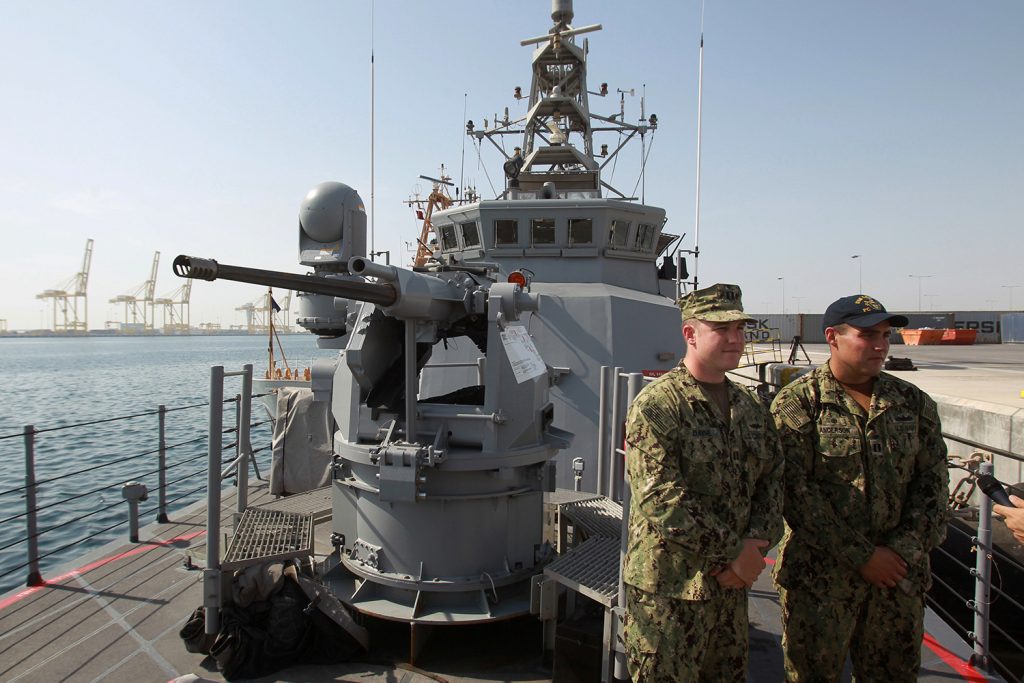
“Détente between the Gulf and Iran is in the United States’ interest because it immediately lessens the burden on the United States to secure its Arab partners.”
Israel will not like the idea of Arab-Iranian détente at first glance, but it should not be concerned about such an agreement making it less safe. In fact, an agreement would deepen the Gulf’s reliance on Israel, as no other nation can offer better intelligence on whether Iran is keeping up its end of the deal. Additionally, the Gulf’s negotiating position with Iran is strengthened by its new and potentially forthcoming relationships with Israel. The UAE is in a strong position to push back on any Iranian request to downgrade relations with Israel, based on the premise that doing so would require violating an existing, internationally supported agreement in the form of the Abraham Accords and a slew of signed memoranda of understanding. No new agreement can come at the expense of a pre-existing agreement.
When measures that seek to reduce tension between Iran and its neighbors are discussed, distrust among the countries is always an obstacle. To address this trust deficit, the United States, Europe, and Russia could carry out an important function for both Iran and the Gulf by verifying and monitoring compliance with these measures.
Most Middle East observers thought that they would never see normalization between Arabs and Israelis in their lifetimes. Now that we have seen this step taken—this chasm jumped—there is no reason not to envision Arab-Iranian normalization if the regimes prioritize long-term national interests like their economies, their self-sufficiency, and the future well-being of their publics. This roadmap is theirs for the taking.
Kirsten Fontenrose is the director of the Scowcroft Middle East Security Initiative at the Atlantic Council.
Further reading
Image: A Yemeni government fighter fires a vehicle-mounted weapon at a frontline position during fighting against Houthi fighters in Marib, Yemen on March 28, 2021. Photo via REUTERS/Ali Owidha.
